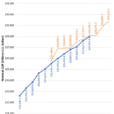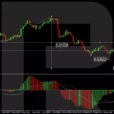A final reflection on the way of the world before getting back to FinTech and banking. Whilst on holiday, we became interested in buying a property in Dubai, and began making enquiries. It soon transpired that this would be a dream, as the average price of a villa on the Palm was over $4 million, which is not the sort of loose change I’m carrying today, even with my cryptocurrency investments.
It then struck me that in many of the most desirable cities of the world, the average property price is over $1 million. In London, it’s $1.5 million in most boroughs, with the most elite areas like Kensington averaging over $7 million. The same is true in Moscow, Hong Kong, New York and most big cities. Who has $1 million to spare?
As I reflected on this, I came to a realization that the 1% are taking over the world, and pricing the 99% out of it. The 1% are 76 million people. The 99% are the 7.6 billion left over. The 1% are those who can walk into a new off-plan development like the Royal Atlantis Dubai, and buy three off-plan apartments for $10 million as a trophy investment (which someone did last week). That’s how it goes.
This extreme is widening because many of the 1% are buying property, and have been for a long time. It means that the 99% and their children, are finding it harder and harder to find anywhere to live. This extreme has been widening for some time, and governments seem to be ignoring it.
When I was a lad, for example, I could get on the property ladder with a 3.5 times salary mortgage for my first house. At the time, I was earning a meagre graduate salary, age 25, and borrowed the deposit for the house off my parents. Today, the same house would have required a 20 times salary mortgage. The same house.
Of course it is all about the laws of supply and demand, but if the demand is coming from just 1% of the world, what does the other 99% do?
In my own mind, having been ingrained in films like Metropolis, it will lead to a civil backlash. It is unsustainable for 1000’s of properties to be owned as investments and left languishing, empty and vacant. It is especially unsustainable as the ranks of the homeless and struggling to keep a home increase.











Leave A Comment